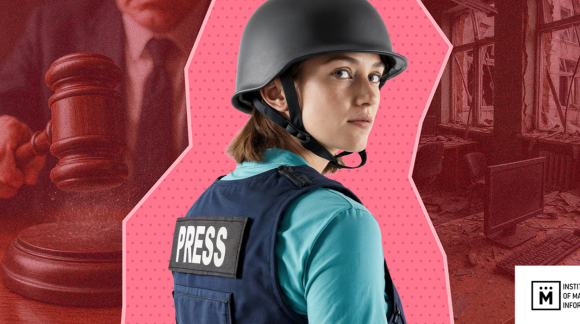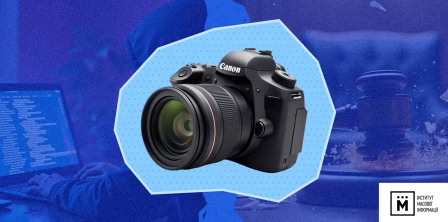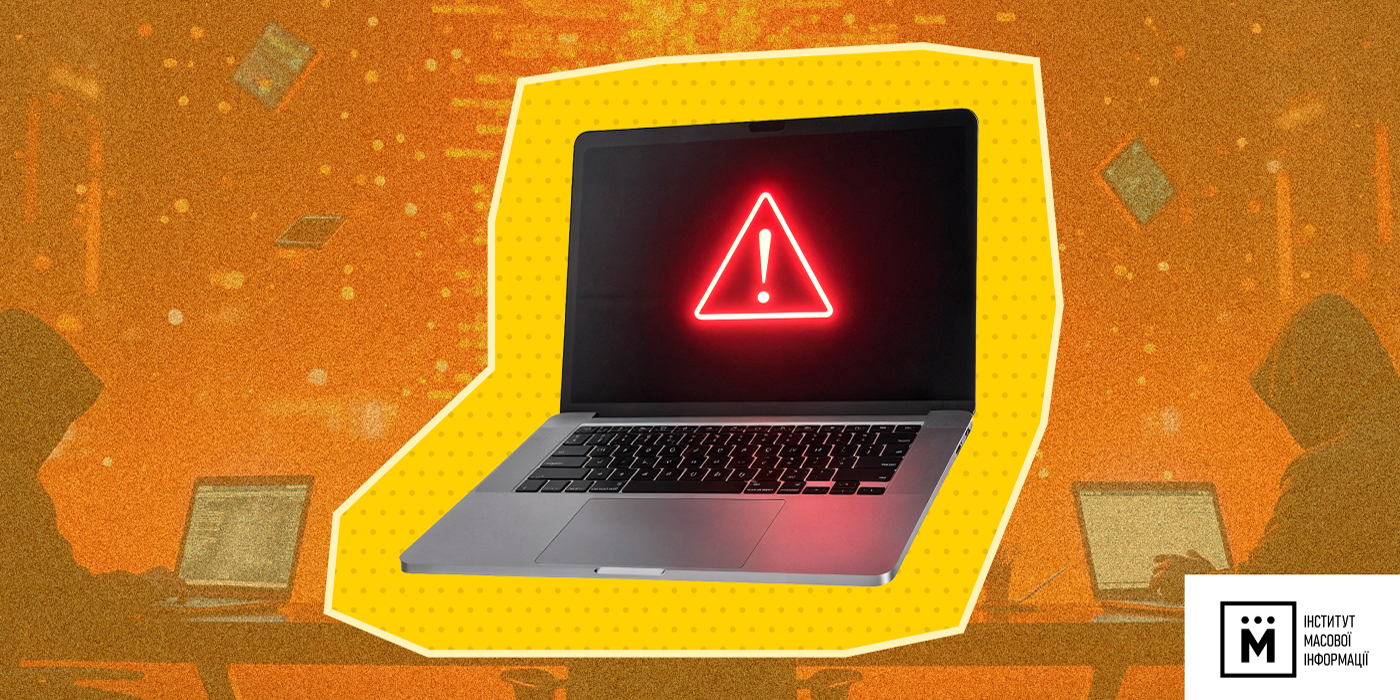In February, the major violation of journalists' rights in Ukraine was the obstruction to carry out legitimate professional journalist activities – IMI recorded 14 cases when journalists were pushed out, or their equipment seized, etc.. To compare, in January, there were 7 such cases. The number of censorship cases also grew twice in February (6 cases), compared with January (3). In addition, IMI recorded 5 cases of political pressure upon the mass media and journalists. These are the data of a monthly monitoring carried out by the Institute of Mass Information.
Several cases of obstruction to professional journalist activities were registered on February 22, the day when the President of Ukraine Viktor Yanukovych held a televised conference "Dialogue with the country." In three cities, in different regions of Ukraine, journalists tried to get to the shooting sites in order to attend live televised communication with the President, but they were not allowed even to approach there. In particular, the police gave ridiculous arguments explaining why the media could not be present – they argued that a shooting site was a private premise, or even told that the event “was for people, not for journalists”.
On February 27, the President once again showed his attitude to mass media, when he was due to participate in a broadened meeting of the government. Even cameramen and photographers, who were always present during government meetings, were not allowed in the session hall. The journalists were not allowed even in the room before the session hall. The press service of the government explained that the room was too small, and there was not enough place for journalists.
As for the cases of censorship, in February of 2013, for the first time since the year 2004, IMI registered temniks – written instructions to journalists on information policy. The press office of Deputy Prime Minister Sergei Arbuzov distributed an email with instructions regarding the media coverage of the gas dispute with Russia.
Another case of censorship was recorded on February 13, when mass media began to remove the news about how state company "Ukrtransgaz" gave 2.5 billion hryvnias from the state budget to unknown companies. The news was removed from the web sites of Tsn.ua and Gazeta.ua.
In February, the media sphere saw a big scandal with UNIAN news agency, which was plunged into political games and was used in manipulative technologies against the opposition. In particular, on February 11, the news agency's website posted fake news about two opposition MPs. After that, the UNIAN journalist collective issued a statement to the majority shareholder Igor Kolomoisky, asking him to fire the new management, who was appointed in early 2012, and to create the editorial council.
Arrests – 1
1. Police detained photo-correspondent at protest action in Kyiv
18.02.2013 The police detained Stanislav Baranets, a photographer of Ukrainian News agency, along with other journalists, at a protest action in Hostynny Dvir in Kyiv, UNN reported.
According to Baranets, police officers told him that they were given the command to detain anyone who was near the Hostynny Dvir, and to take them to the police department, and then to sort out who is who.
In the morning of February 18, social activists – defenders of Hostynny Dvir claimed that unknown people stormed into the territory of the yard and drove out activists who are protesting against the building of a mall with boutiques at its territory.
Threats – 3
1.Donetsk journalists, who wrote about illegal coal mining in Donetsk Oblast, followed by unknown men in Lexus car
07.02.2013 The police of Snizhne city of the Donetsk Oblast is investigating the fact of harassment and obstruction of professional activities of journalists from Donetsk online-editions. Donbass.ua correspondent Hanna Dronenko said this to Interfax-Ukraine on February 14.
She said that during the preparation of a material about illegal coal mining in the Donetsk region, near Snizhne city, journalists were harassed by an unknown person in a Lexus car.
"Yesterday (on February 13) investigators game to us and said that the police opened two criminal proceedings on the fact of plundering the depths, where we go as witnesses, and on the fact of harassment, where we are recognized as victims," ??- said Dronenko.
Earlier, on February 7, a group of journalists went to Pervomayska village of the Donetsk Oblast, to take pictures of an illegal mine. At the site, they found that there was an active mining. Journalists photographed the process, and then went to the city police department. "On the way to the city police department, we were followed by a man in a white Lexus car," – said Dronenko.
2.Crimean parliament deputy threatened to destroy editorial office over article about Soviet monuments
19.02.2013 Vyacheslav Zakharov, a Crimean parliament deputy and second secretary of the Communist Marxist-Leninist Party of Ukraine , threatened to crush the Crimean Office of Kommentarii weekly through an article titled "Where in the Crimea people are waiting for "Svoboda " party with sledgehammers." In its article, Kommentarii compiled a "black list" of Soviet-era monuments at risk to repeat the path of the Lenin monument, which was destroyed on February 15 by activists of "Svoboda" party in the Sumy region.
Zakharov was outraged by this article, called to the editorial office: "What do you advise in their materials? I'll be in your wording down, because I so advised … More like this publish will believe me, will have to deal with me! I still write in the SBU, as in this case, the material is called – the undermining of the peace in the Crimea. That you have to be responsible for law and, in addition, will have to deal with me."
3. Foreign journalists threatened after they filmed illgela mine in Donetsk region
19.02.2013 Correspondents of 24th Channel (France) and BBC, who took video of an illegal mine in Snizhne village of the Donetsk Oblast were followed by unknown people.
After the camera group took video of the illegal mine, local workers made several calls on mobile, and told journalists to “ran away” because they will be “buried in the mine”. When the journalists were leaving the village, they noticed that they were followed by two cars – Daewoo Sense and Hunday Accent, which tried to push the journalist’s car to the roadside. They stopped the chase only when the journalist’s car reached the international highway Donetsk-Rostov.
Impeding professional journalist activities – 14
1. Firtash’ enterprise guards attacked TVi journalists in Cherkasy
04.02.2013 In Cherkassy, the guards of “Azot” enterprise were hampering a TVi camera-group – journalist Maxim Savchuk and operator Anton Kviten – to take the overall plan of “Azot” enterprise, twisted their arms, threatened to arrest, and forced to delete the video, Gazeta.ua reports.
"We came in Cherkasy, because we are preparing a report on why it was impossible to determine the winner of parliamentary elections in a local district. Since Mrs.Zhukovskaya heads Azot enterprise, we wanted to shoot wide shots, the logo of the company, and so on. When we started to shoot, two men came out and began to shake the camera, saying it's forbidden to shoot there as it was a private area. I explained that we were standing on the pavement, belonging to the general community. The guards began to squeeze us, one of them threatened us with an arrest for three hours… They behaved as real bulls. One of them attacked us with threats, forced us to erase everything that we recorded, twisted our arms. I managed to grab the equipment and hide in the car "- said the journalist Maxim Savchuk.
"They forced us to erase he video, saying that both of us will be “knocked out". They repeated it several times," – said the operator Anton April.
The camera-group was also forced to leave the place where they parked, explained that there were parking places for the bosses. "Do we have traffic laws that restrict parking for a particular person?" – rhetorically asked Maxim Savchuk.
The journalists called the police and filed an application about the violation of their professional journalist rights under Article 171 of the Criminal Code of Ukraine. "We heard a lot about Valentina Zhukovska, how much she has done for the city, but the behavior of her guards quite differently characterized their leadership" – said Savchuk.
Azot enterprise belongs to Ukrainian tycoon Dmytro Firtash.
IMI media-lawyer Roman Golovenko believes that, because of the behavior of the guards, the police can open proceedings under Art. 171 of the Criminal Code of Ukraine, Article 356 (arbitrariness), and articles on bodily injuries.
2. Guards in parliament tried to expel journalists from press box
05.02.2013 Guards of the State Guards Department, working in parliament, tried to expel journalists from the press box on February 5, said Cenzor.net.
Journalists asked for help and protection in the session hall, and asked members of parliament to influence the situation. In turn, MPs claimed to the guards that such orders could not be made. After that, some MPs, including Katerynchuk, climbed into the press box, hampered the guards to expel journalists.
Those journalists who left the pres box, were not allowed to return by the guards.
According to UNIAN, the guards motivate their actions by saying that the session of Parliament was not taking place. Asked to name the person who ordered to expel the journalists, the guards refuse to reveal it, and only stated that it was the order of the Verkhovna Rada.
3. Kerch.FM journalists were not allowed at public event
09.02.2013 Journalists of Kerch.FM web site were not allowed to attend an award ceremony in “Korabel” house of culture.
Kerch deputy mayor Oleksiy Milovanov hampered two journalists to work, noting that there was little space in the hall where the event was taking place. Journalists had to remind officials of their responsibility for impeding legal professional journalist activities. In response, Milovanov said: "I told you everything", and offered to complain to police.
Journalists managed to get inside the building only after long conversations with the guards and talks with press-service chief Olha Arhypenko.
According to the web-site, the guards at the entrance of the house of culture were also instructed not to let journalists of "Briz" TV-radio company. At the same time, journalists of other Kerch publications, groups of two to five people, freely passed into the building.
4. Journalists not allowed at territory of electoral commission in Kirovograd Oblast
12.02.2013 Journalists of Grechka Internet-edition and TV 5 Kanal were not allowed to enter the premise of the district council, where the territorial electoral commission was situated. At that time the electoral commission was counting the votes on the local Pershotravenska electoral district.
5. Police and journalists scuffled in court
13.02.2013 A scuffle between journalists and employees of Gryphon special police department took place in Kyiv in the premise of the Court of Appeal, which heard the case on the murder of deputy Yevhen Shcherban.
Despite the decision of judge Oksana Tsarevych to permit media to be present in the boardroom, the Gryphon employees did not allow journalists, who came out to report the news, to return.
The policemen did not respond even to phrases journalists that in the boardroom they left their personal belongings.
"We do not want to let them, and that’s all" – said one of the special police force employees.
6. Officials banished journalists from a session of executive committee
13.02.2013 In Nizhyn town of the Chernihiv Oblast, journalists of local TV-station "Phobos" and of "Uyezdnye Novosti" edition were kicked out of a working group meeting, which took place in the Nizhynsky executive committee, Uyezdnye Novosti reported.
According to the edition, the meeting dealt with the situation in the first Nizhyn school. The time and place of the meeting was kept as a strict secret, the edition says. Journalists got to know about it from Internet-forums. Representatives of the paternal committee of the school were not invited to the meeting as well.
The Internet-edition listed the names of officials who protested against the presence of journalists at their meeting. In particular, they were Oleh Barankov, deputy mayor and chairman of the working group, deputy mayor Svitlana Vasylieva, deputy head of education department Nadia Ponomarenko, and head of the legal department Volodymyr Hradobyk.
7. Donetsk journalists hampered to take video of crashed plane
13.02.2013 In Donetsk, an unknown man impeded journalists of "Donbass" TV-station to film the crash site, with throwing snowballs at the camera, said Odesa.Kommentarii web site.
The TV camera group filmed the work of rescuers near the crashed plane, when an unknown man rudely demanded them o stop shooting, saying that he will throw snowballs at the camera.
In response, the journalists pointed to him that if he would throw snowballs at the camera, he would commit a criminal offense. However, the man threw snowballs at the camera, and hit the lens. In comments to thevideo, which was posted in the Internet, people claimed that the man who threw snowballs was a police officer, but this information was not confirmed.
On February 13, an AN-24 plane fell and crashed in the Donetsk airport, killing 5 people.
8. Journalists were not allowed at trial on Scherban case
15.02.2013 Journalists could not enter the courtroom of the Court of Appeal of Kyiv, where the Pechersky Court conducts investigations into the murder of MP Yevheniy Shcherban, Ukrayinska Pravda said. The trial administrator announced the ruling that banned journalists.
The trial is headed by Victor Kytsyuk. On February 15, it should have interrogated new witness Zaitsev. The trial administrator also announced that the former prime minister Yulia Tymoshenko had refused to be taken to court.
9. Berkut special police force chief accused of attack on journalist
18.02.2013 During a protest action in the Hostynny Dvir in the center of Kyiv, police impeded professional activities of photographer Maxim Trebuhov. According to Trebuhov, he was punched in the face by Volodymyr Alexandrov, commander of Berkut special police force, who headed the police operation in the Hostynny Dvir. According to the photo-correspondent, Alexandrov came to him at the moment when he was taking photos of events that took place in the yard. Trebuhov was also impeded by another police officer – head of Public Order Department of the Podilska District Administration of Kyiv Izmaylov, who was dressed in civilian clothes. "He threatened me that he will punish me. What he meant, I do not know. He tried to hit me down with his leg. My colleagues warned him that his actions were illegal, that he was without uniform. But he cursed, and called us yellow press "- Trebuhov said.
10. Lviv journalist was not allowed at televised bridge with Yanukovych
22.02.2013 Two unknown men in civilian clothes hampered professional activities of Express newspaper journalist Olga Pilischuk in the village of Pnykut in the Lviv Oblast, where there was organized a televised bridge with President Yanukovych within frames of his "Dialogue with the country" project.
The men grabbed the journalist by her arm, and, despite her protests, physically pushed her from the territory of a building, where the event was to be organized.
According to the newspaper, the building and its territory were surrounded by more than 15 law enforcement officers and people in civilian clothes. Earlier, Pilischuk showed her journalist card, but police refused to let her in the territory, without explaining the reasons. Unofficially, police said they had instructions to allow only the people who were “in the list”.
"At this point, TV-journalists began to record on cameras the dialogue with police, which was violating the law. Having used the fact that the police was confused, the journalist entered the territory of the house. It caused the negative reaction of people in civilian clothes who, as you can tell, were employees of the SBU "- the journalist stressed.
Olga Pilischuk told IMI that, when she arrived to the building, where the televised bridge with Yanukovych was to be organized, she was asked to wait. "We waited for 30 minutes, and then a police officer came out and told us it was a private property and we would not be allowed, since there was an expensive equipment and, maybe, we wanted to disrupt the televised conference," – said Pilischuk.
The journalist is going to submit an application to the police on the fact of impeding her professional journalist activities.
11. Odessa police did not let journalists to attend Yanukovych's teleconference
22.02.2013 A journalist of Vzglyad iz Odessy web-site was not allowed in the kindergarten № 195 in Odessa, which participated in the televised conference with President Yanukovych within frames of “Dialog with the Country” project.
According to the web site, when a journalist tried to go in the kindergarten, the police did not let him.
When asked why they did not allow the journalist to pass, Deputy Head of the Odessa Oblast Interior Ministry Department Dmytro Fuchedzhi said: "There is a quarantine in the kindergarten, you need to go to the polyclinic, take a certificate, and then you have allowed."
"So, the quarantine was declared to stop spreading a plague?" – the journalist asked. – "No, to stop all sorts of idiots from breaking there " – Fuchedzhi answered.
Journalists of several other Odessa editions also could not get into the kindergarten.
The web-site pointed out that nobody informed the journalists of the place and time of the President’s teleconference, and the venue was surrounded by police and SBU employees.
12. Kakhovka journalists were not allowed to attend the President’s “Dialog with the Country”, because the event was for people, not for journalists




